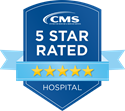 Door County Medical Center (DCMC) has received a 5-star rating for Overall Hospital Quality from the Centers for Medicare & Medicaid Services (CMS). It is the highest rating possible, and places Door County Medical Center in the top 14 percent of hospitals in the United States and the top 18 percent of hospitals in Wisconsin. “I’m not surprised they’ve received such a high rating,” says Bill Welter, a patient of Dr. Kelton Reitz, DO, “It’s reflected in the service my wife and I have received.”
Door County Medical Center (DCMC) has received a 5-star rating for Overall Hospital Quality from the Centers for Medicare & Medicaid Services (CMS). It is the highest rating possible, and places Door County Medical Center in the top 14 percent of hospitals in the United States and the top 18 percent of hospitals in Wisconsin. “I’m not surprised they’ve received such a high rating,” says Bill Welter, a patient of Dr. Kelton Reitz, DO, “It’s reflected in the service my wife and I have received.”
Care Management
In 2017, the Care Management program was developed as a way to improve patient outcomes and help patients achieve their healthcare goals. “In large part, I attribute the high CMS rating to the efforts Door County Medical Center has made to improve care management,” says Nancy Daoust, Chief Quality Officer at DCMC.
 Care Management is a physician ordered program whereby patients with chronic illnesses, or patients being discharged from the hospital, are connected with a nurse—a Care Manager—who acts as their single point of contact to the healthcare system. Put differently, the Care Manager takes on the responsibility of helping the patient navigate the healthcare system, ensuring that the patient has sufficient support throughout their healing journey.
Care Management is a physician ordered program whereby patients with chronic illnesses, or patients being discharged from the hospital, are connected with a nurse—a Care Manager—who acts as their single point of contact to the healthcare system. Put differently, the Care Manager takes on the responsibility of helping the patient navigate the healthcare system, ensuring that the patient has sufficient support throughout their healing journey.
As a single point of contact to the healthcare system, Care Managers help the patient meet their goals by:
-
Scheduling—even attending—doctor and specialist appointments.
-
Following up with patients once they’re home.
-
Managing the patient’s prescriptions and medications.
-
Researching and answering questions the patient, or even the Care Manager, may have.
 There are two types of Care Management: Transitional Care Management and Chronic Care Management. Transitional Care Managers are assigned to the patient for a period of 30 days after the patient is discharged from the hospital or Skilled Nursing Facility. Chronic Care Managers are assigned to the patient indefinitely. In these cases, relationships that are built between the patient and the Care Manager often extend for years.
There are two types of Care Management: Transitional Care Management and Chronic Care Management. Transitional Care Managers are assigned to the patient for a period of 30 days after the patient is discharged from the hospital or Skilled Nursing Facility. Chronic Care Managers are assigned to the patient indefinitely. In these cases, relationships that are built between the patient and the Care Manager often extend for years.
There are currently 141 patients in the Chronic Care Management program and five Care Managers, each are Registered Nurses: Lucy Stary, Calle Stenzel-Kring, Stacie Jacquet, Megan Fox and Mona Rabas.
Incredible experiences with DCMC’s Care Management Program
Following Margie Hedsand’s hospitalization, she was assigned a DCMC Care Manager. According to her daughter, Lori Flick, Margie’s Care Manager not only took care of all the responsibilities listed above, she also stayed in contact with Lori so that they could collaborate on Margie’s care. “She made sure I was aware of signs to watch for, because she knew I was close to my mother and would be able to recognize any early warning signs that action might need to be taken,” recalls Lori.
When Margie and Lori heard that CMS awarded DCMC a 5-star rating, they remarked, “We would give them a 10-star rating if we could. The care and compassion we received from the nurses and doctors was above and beyond what we would expect anywhere. Personal care and personal touch. They make you feel comfortable—like you are not wasting anyone's time.” “In fact, I was so impressed with my mother’s care,” Lori says, “that I transitioned her primary care to Dr. Rietz and his team.” To this day, over a year after Margie’s hospitalization, Margie and her Care Manager remain in touch with each other, and their patient/provider relationship continues to evolve into a priceless friendship.
Bill Welter had a similar experience with the Care Manager that was assigned after a procedure. “The best way to describe her role,” Bill recalls, “was that she was the quarterback.” He continues, “She coordinated all the next steps: x-rays, talking to the pharmacy, appointments with specialists—Lucy was the one person in my care team who knew exactly what was going on at all times.”
The Care Manager’s care and attention had a direct impact on Bill’s healthcare results. At one point a blood test indicated a low red blood cell count, “She had the ability to go back and look at blood tests from three and four years ago to compare current results and see that I’d always had a low red blood cell count, that it was nothing to be concerned about.” He adds, “She is still the care management person for me and my wife—we still go to her with questions.”
More Than Just a Number
“Our community is so privileged to have DCMC as a health care provider,” Welter remarks, adding, “The quality of healthcare is one of the reasons we decided to live here. It’s better than any of the large cities we lived in previously. Every provider is concerned about making sure each patient is treated properly and receives the most advanced care. You’re not just a number—you have a relationship with your providers.”
Through programs like Care Management, Door County Medical Center and all of its providers continue to prove that they value patient care above all else. As a result, they continue to earn accolades from organizations like the CMS.
 “We are absolutely committed to every patient’s health beyond their visits with us,” says Jenna Jennerjohn, RN BSN, CPHQ, Quality Director at DCMC and manager of Care Management. “We want to make sure our patients have the support they need to navigate the complexities of the healthcare system and have the information and support they need to make good healthcare decisions,” she notes, adding “The Care Management program is just one example of the many ways DCMC supports our patients, their families, and caregivers throughout the continuum of care.”
“We are absolutely committed to every patient’s health beyond their visits with us,” says Jenna Jennerjohn, RN BSN, CPHQ, Quality Director at DCMC and manager of Care Management. “We want to make sure our patients have the support they need to navigate the complexities of the healthcare system and have the information and support they need to make good healthcare decisions,” she notes, adding “The Care Management program is just one example of the many ways DCMC supports our patients, their families, and caregivers throughout the continuum of care.”
About CMS Overall Hospital Quality Rating
Hospitals report data to the Centers for Medicare & Medicaid Services through the Hospital Inpatient Quality Reporting (IQR) Program, Hospital Outpatient Quality Reporting (OQR) Program, Hospital Readmission Reduction Program (HRRP), Hospital-Acquired Condition (HAC) Reduction Program, and Hospital Value-Based Purchasing (VBP) Program.
The Overall Hospital Quality Star Rating combines a variety of measures across five areas of quality into a single star rating for each hospital. Categories include Mortality, Safety, Readmission, Patient Experience and Timely and Effective Care. Overall Star Ratings aren’t calculated for Veterans Health Administration (VHA) or Department of Defense (DoD) hospitals.
For more information about the CMS Overall Hospital Quality Star Rating program, visit www.data.cms.gov/provider-data/topics/hospitals/overall-hospital-quality-star-rating.